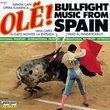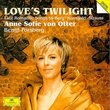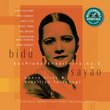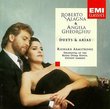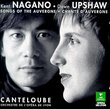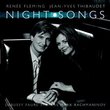| All Artists: Benjamin Luxon, Maurice Durufle, Gabriel Faure, Francis Poulenc, Martin Neary, Philip Ledger, English Chamber Orchestra, John Butt, Arleen Auger Title: Faur�: Requiem; Poulenc; Mass in G; Durufl�: Two Motets Members Wishing: 0 Total Copies: 0 Label: EMI Classics Original Release Date: 1/1/2007 Re-Release Date: 1/23/2007 Genre: Classical Styles: Opera & Classical Vocal, Historical Periods, Early Music, Symphonies Number of Discs: 1 SwapaCD Credits: 1 UPC: 094637590621 |
Search - Benjamin Luxon, Maurice Durufle, Gabriel Faure :: Faur�: Requiem; Poulenc; Mass in G; Durufl�: Two Motets
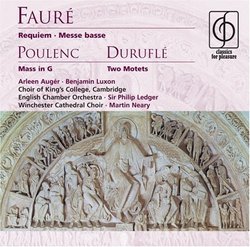 | Benjamin Luxon, Maurice Durufle, Gabriel Faure Faur�: Requiem; Poulenc; Mass in G; Durufl�: Two Motets Genre: Classical
|
Larger Image |
CD DetailsSimilarly Requested CDs
|
CD ReviewsA voice teacher and early music fan George Peabody | Planet Earth | 01/07/2009 (5 out of 5 stars) "ARLEEN AUGER'S 'PIE JESU' (SURELY ONE OF THE GREATEST RENDITIONS) MAKES THIS A COLLECTIBLE!.
This disc contains two different King's College Choirs (1980&1982) under the direction of Sir Philip Ledger and the Westminster College Choir(1987) under the direction of Martin Neary. Gabriel Faure's(1845-1924) 'Requiem' stands in a class of its own in its unusual choice of texts and its restrained, melodious simplicity, joined only by Maurice Durufle's Requiem (not on this disc). Faure began composing his Requiem in 1887 and it went through many variations until the final version in 1889 that you hear on this recording. Faure finally achieved his goal, which was to make his 'Requiem' intimate, peaceful and loving. In fact he stated to one of his friends concerning this desire 'It is as GENTLE as I am myself'. The 'MESSE BASSE (low mass), which Faure referred to with greater liturgical accuracy as his 'Little Mass', was intended for women's voices and soloists with accompaniment for organ or harmonium. It subsequently went through a few versions and finally in 1906 was completed and this version you hear on this disc. Maurice Durufle(1902-1986)was an organ virtuoso and as the most self-critical of composers, he wrote much fewer compositions than most others of his era. He constantly revised and rejected in his search for the ideal; nonetheless, his music is by no means lacking in spontaneity or ease of expression. The same thoughtful qualities of finished workmanship that went into his 'Requiem' (not on this record) may also be found in the two short Motets 'Tu es Petrus' and 'Tantum Ergo' that date from 1960. The performance by the King's College Choirs of the Faure 'Requiem' and the Durufle 'Motets' is wonderfully executed. Ledger seems to get an inordinate amount of expression from his groups. The boy sopranos who have mega solo-sections in the Requeim are exquisite, and the rest of the choir follows suit with a lightness of tone quality that these works demand. The two soloists in the 'Requiem': Arlene Auger 'Pie Jesu' is breathtaking in her performance and Benjamin Luxon's solos in 'Libera me' are neatly performed. The English Chamber Orchestra, with their cleanly articulated brass entrances add much to the overall underlying excitement and John Butt (organ) never disappoints. The Faure 'Messe basse' is sung by the Choristers (young boys) and, although they sang it well, I did not personlly find it very interesting. Francis Poulenc's (1899-1963) 'Mass in G', composed in 1937, is for unaccompanied mixed choir. Two musical influences for Poulenc may be clearly identified: Stravinsky's neo-classical idiom, vocal and instrumental, seems to be echoed in more than one feature of the Mass. The other influence is that of the pianist-composer's own fingers. This is demonstrated by the fact that the harmonic sequences of the Mass so patiently derive from struck chords, and not from the conjunction of polyphonic strands, which incidentally makes intonation quite difficult in this work. The Westminster Cathedral Choir under the direction of Martin Neary have no trouble with intonation; they sing this exceptionally well, and I found the work to be quite interesting and enjoyable. A LOT OF MUSIC FOR A SMALL PRICE!!!! " |

 Track Listings (18) - Disc #1
Track Listings (18) - Disc #1

